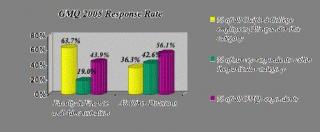On Jan. 20, Guilford announced the results of the college’s staff and faculty satisfaction survey for the 2005-06 academic year. The Group Management Questionnaire (GMQ) – an anonymous, first-time online survey according to Guilford’s Strategic Long-Range Plan – assessed the satisfaction with management and group effectiveness of 130 faculty and staff – about 25 percent of the whole body.
The results show a 6.99 overall satisfaction level on a 9-point scale (1 being lowest), with the highest-scoring categories being “Purpose and Direction” and “Group Climate,” and the lowest being “Reward, Appreciation, and Recognition” and “Supervision.” Males are generally more satisfied than females in all eight categories, and Guilford is still short of the target minimum of 7.5 in each category.
“This is what I call taking the temperature of the college,” said President Kent Chabotar, who proposed the survey. “The surprising thing about [the survey] was how high the scores were.”
As for the areas of concern, Guilford has introduced two teaching and one staff award this year. “People were also talking about the need for people to say ‘thank you,’ to be recognized for outstanding service, orally or with notes,” said Chabotar.
To improve supervision, Guilford will start a mandatory First-Year Experience class for new employees instead of the current one-day orientation, as well as extra training for faculty and staff in management positions. “In every area we need to do better because we are not at our goal yet,” said Chabotar.
“I’m glad they are willing to get our opinions in a survey and open the door to discussing the issues further,” said Sonya Mitchell-Duffy, Information Systems Specialist with IT&S.
Unlike previous all-faculty-and-staff surveys, the GMQ was done entirely online and without cost, except for the efforts of IT&S, which executed the operation in late November and early December of 2005.
“We have a pretty good return rate for the first time. I think we are going to have a better return rate next time,” said Chabotar.
The results showed that 27.6 percent of all faculty and staff responded. However, the return rate varied from 9 percent for all administrative staff (8 respondents) to 66.7 percent for the President’s Office (14 respondents).
However, many faculty and staff did not see the results, and a significant number did not hear of the survey to begin with, despite Guilford sending personal e-mail invitations in November and publishing survey results and analysis in the Jan. 20 issue of The Guilford Beacon.
“The Buzz and The Beacon are the ways to receive campus information,” said Teresa Sanford, Associate Director of Applications Development and Support. “If people choose not to read it, then they may miss important information.”
“A lot of people in facilities don’t bother to check the e-mail because they don’t get personal e-mail,” said Bill Rogers, Assistant Manager of Building Services. “Some of them don’t even know how to use a computer. If you really want feedback, there is a way to do it. On The Buzz, not everybody will respond.”
In response, Chabotar said in an e-mail, “There are two unassigned computers in facilities, and facilities folks have also regularly used the computers in Bauman, Founders, and elsewhere. I am disappointed that more folks did not find twenty minutes over a three week period to complete the questionnaire.”
“It’s discriminatory toward people who don’t have desk jobs when all the information we get is online,” said an administrative staff member who wished to remain anonymous. Likewise, many staff members refused to comment on the survey or be quoted for fear of administrative retribution.
“I’d ask them to cite a single incident since I arrived when I have fired or disciplined anyone for telling me the truth or what they thought was the truth and backed it up with data,” said Chabotar. Yet he agreed to have both paper and electronic ballots for the next survey in 2007 to maximize participation.
The new survey will measure management satisfaction not only by division, but by department, which can add precision to the study as well as increase response rates in all divisions. According to Chabotar, it may as well be extended to student-workers, whose feedback has thus far been limited.
“It is the college’s continuous effort to get data and fact as opposed to anecdotes and bias,” said Chabotar. “Some folks never let the facts get in the way of their prejudices.

